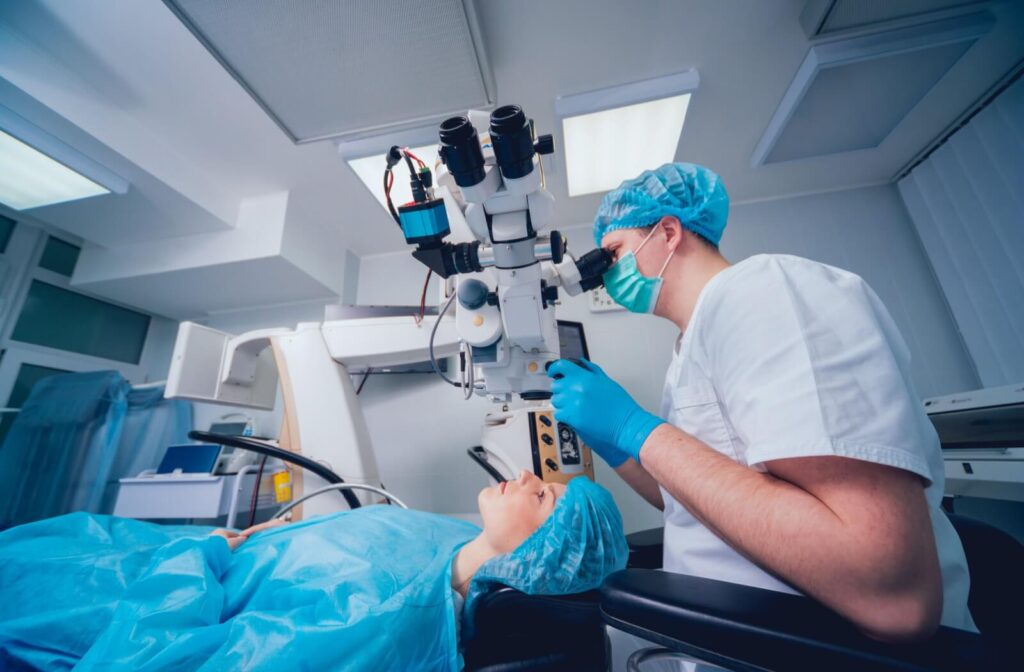While myopia cannot technically be reversed, LASIK can fix myopia for people tired of wearing glasses or contact lenses. Think of it as a permanent vision correction that doesn’t rely on wearing contact lenses or glasses.
LASIK is not for everyone, though. Fortunately, even if LASIK isn’t an option, other correction options may suit your needs and lifestyle. The first step is talking to your eye doctor. They consider your situation when recommending effective myopia treatment or correction options.
What Is Myopia?
Myopia, commonly called nearsightedness, is a refractive error that makes it difficult to see distant objects clearly. This happens when the eyeball is too long or the cornea is too curved, causing light to focus in front of the retina instead of directly on it.
The symptoms of myopia are easy to spot:
- Blurry vision when looking at distant objects like road signs or classroom boards
- Squinting to improve focus
- Eye strain, especially when driving or doing things that require distance vision
For those with myopia, everyday tasks like driving or watching TV can become challenging without glasses or contact lenses.
How Common Is Myopia?
Myopia is widely prevalent, affecting over 40% of the US population, and these numbers are expected to rise. The incidence of myopia is notably higher among school-age children.
Understanding the risks and available treatments early on is key to managing this condition effectively.
Risk for Developing Myopia
While genetics play a significant role in whether someone develops myopia, lifestyle factors are increasingly recognized as contributors. Here’s what may increase your risk:
- Family history: If one or both parents have myopia, you’re more likely to develop it
- Prolonged near work: Spending long hours reading, writing, or using digital devices can strain your eyes and potentially lead to myopia
- Limited outdoor activity: Research suggests that spending less time outdoors, particularly in childhood, may increase the likelihood of developing myopia
Common Treatments for Myopia
There isn’t always a one-size-fits-all solution to treating myopia. The correct approach depends on factors like age, lifestyle, and the severity of the condition.
For Children & Adolescents
Since LASIK is typically only available to adults above 18, children and teens with myopia require other treatment methods:
- Eyeglasses: The most common and easily accessible solution for children
- Contact lenses: Ideal for older children or adolescents who are comfortable with handling lenses
- Orthokeratology (ortho-k): Special contact lenses worn overnight to reshape the cornea temporarily
- Atropine eye drops: Low-dose atropine may slow myopia progression in children
For Adults
Adults often rely on glasses or contact lenses to manage myopia. But many seek permanent solutions like LASIK for a more convenient, glasses-free lifestyle.

What Is LASIK?
LASIK (laser-assisted in situ keratomileusis) is a surgical procedure that corrects refractive errors like myopia, hyperopia, and astigmatism by reshaping the cornea. Using precise laser technology, the surgeon reshapes the cornea so that light focuses properly on the retina, resulting in clearer vision.
The procedure is quick, typically taking about 15 minutes per eye, and recovery is often rapid. Most patients notice improved vision within a day or 2.
LASIK offers an appealing alternative to glasses or contacts, enabling people to enjoy sharper vision without relying on external aids.
Who Can Get LASIK?
While LASIK is an effective treatment, it’s not suitable for everyone. You may be a good candidate if you:
- Are over 18 years of age
- Have had stable vision for at least a year (minimal changes in prescription)
- Have mild to moderate myopia (though more severe cases may also qualify)
- Have healthy eyes without conditions like glaucoma, cataracts, or severe dry eye
A thorough laser eye surgery consultation with a qualified eye doctor is crucial to determine whether LASIK is the right option for your unique needs.
Choosing LASIK Over Glasses & Contact Lenses
A significant appeal of LASIK is the freedom it provides. Here’s why more people are turning to it:
- Convenience: No more fogged-up glasses or the daily ritual of inserting and removing contact lenses
- Clearer vision: Many LASIK patients achieve 20/20 vision or even better post-surgery.
- Long-term cost savings: While the upfront cost of LASIK can be significant, it’s often more cost-effective than decades of purchasing glasses, contacts, and solutions
- Enhanced confidence: Enjoy sharper vision while skipping cumbersome eyewear
LASIK can be especially life-changing for active people. Imagine swimming, exercising, or hiking without compromising your vision or worrying about misplaced glasses.
Potential Risks of LASIK
While LASIK is generally safe and effective, it’s essential to recognize the potential for side effects:
- Dry eyes: A common side effect post-LASIK, typically resolves on its own
- Temporary visual disturbances: Some patients may notice glare, halos, or light sensitivity during the healing process
- Undercorrection/Overcorrection: Rarely, a follow-up procedure might be needed to fine-tune results
Choosing an experienced surgeon minimizes risks and maximizes the chances of a successful outcome.
Long-Term Outcomes of LASIK
For the vast majority of patients, LASIK delivers excellent long-term results. Follow-up studies reveal that 96% of LASIK patients are satisfied with the outcome, reporting improved quality of life and vision clarity.
Occasionally, vision changes may occur with age, such as presbyopia, but LASIK typically remains a permanent solution for nearsightedness.
Your Next Steps for Clearer Vision
Myopia is manageable, and advancements like LASIK offer the freedom to experience life with crystal-clear vision. Whether you’re tired of dealing with the inconveniences of glasses and contacts or are ready to explore new possibilities, LASIK could be the answer you’re looking for.
If you’re still wondering if LASIK fits your lifestyle, schedule a consultation with The Eye Care Team in one of our 2 locations to discuss your options.



